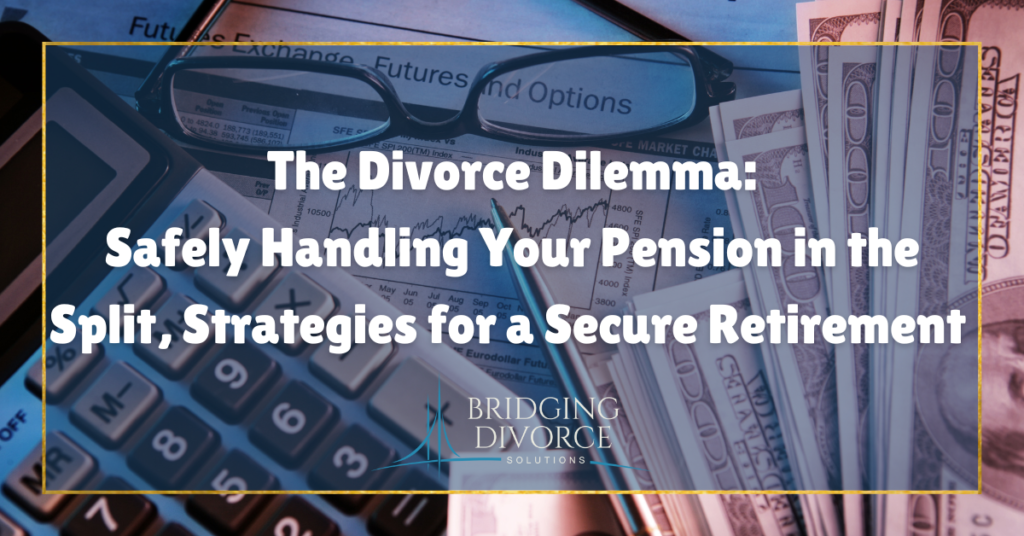Divorce can have a profound emotional impact and leave lasting financial consequences. The pension plan can be particularly challenging when separating assets. If you’re facing a marital split, here are four practical ways, based on expert advice, to be apprised of your pension benefits.
Key Takeaways
- Familiarize yourself with your state’s laws or find an attorney and CDFA who are experts in the type of pension in question.
- Learn if a qualified domestic relations order (QDRO) is required or allowable to grant your ex-spouse a share of your pension benefits. Examine the terms outlined in your pension plan to determine how the division of the pension will occur; some plans do not allow division.
- Explore alternative options, such as offering other assets or proposing a balanced trade-off instead of dividing your retirement.
- Seek professional guidance from a Certified Divorce Financial Analyst to navigate the complexities of asset division.
Remember, the pension was part of your financial planning as partners, it’s part of your marital assets and subject to division. Often people think that they get all of “their” pension in a divorce, that is usually not the case if it was earned while you were married.
Understand Your State’s Laws
The first step in understanding how to treat your pension during a divorce is to familiarize yourself with your state’s regulations. Some types have intricacies specific to the type of pension, and military and educational institutions often have very specific rules pertaining to divorce. While an investment account can be divided between spouses, this is not automatic with pensions. In fact, sometimes it’s not possible. Your soon-to-be ex-spouse must request a portion of the accumulated pension by filing a qualified domestic relations order (QDRO) before the divorce is finalized and the plan must approve that request.
Typically, the rule is to divide the pension benefits earned during the marriage equally. However, your spouse is entitled only to the amount accumulated during that period—any contributions made before the union would not be subject to division. These are considered non-marital or separate property. A CDFA® can calculate the amount of the pension that is marital.

Assess Your Pension Plan Details
Once you understand the laws governing pension division in your state, examining your pension plan’s specifics is crucial. Pay close attention to two key aspects: the distribution method and the availability of survivor benefits.
You may receive a lump sum payment or a monthly annuity in a defined benefit pension plan. Depending on your plan, the annuity payments may cease upon your death or continue for the surviving spouse’s lifetime. It is essential to know these details as they impact how the assets will be divided during the divorce process. If the benefits stop upon death, your spouse may request you carry life insurance to continue their income stream when the pension stops.
The QDRO must adhere to specific guidelines to ensure compliance with the Employee Retirement Income Security Act (ERISA) and state laws. ERISA establishes regulations to protect beneficiaries and participants in employer-sponsored retirement plans.
Propose Alternatives
If you’re hesitant to divide your pension equally, consider offering your spouse alternative assets. For example, you might allow your ex-spouse to retain sole ownership of a mortgage-free home you co-own, or you could purchase a life insurance policy that names your ex-spouse as the beneficiary, offsetting the pension benefits with an equivalent value asset.
In cases where both spouses have pensions or other retirement assets to protect, reaching an agreement to keep what each party already possesses can expedite the resolution and minimize complexity.

Consult with a Professional
No matter the stage of your divorce proceedings, seeking professional advice is always wise. Certified Divorce Financial Analysts (CDFAs) are experts in asset division during divorce and work in conjunction with lawyers to make informed decisions.
When consulting with a CDFA, they will assess your financial situation, establish a budget, determine investment risks, and review all your assets, including retirement plans. They will guide you in understanding how the division of assets will impact your future and any tax implications you may face.
Remember that CDFAs do not provide legal advice or assistance and should not replace the role of an attorney or mediator.
Protect Your Future Financial Well-Being
Divorce is undoubtedly stressful, especially when it involves securing your retirement. Take the necessary steps to educate yourself and make informed decisions about protecting your pension. Understand the laws in your state, explore the details of your pension plan, consider alternative options, and seek guidance from a professional CDFA.
By taking these measures, you can safeguard your pension and ensure a secure financial future for yourself. Divorce may be challenging, but with the right knowledge and support, you can navigate the complexities and emerge with your retirement intact.




